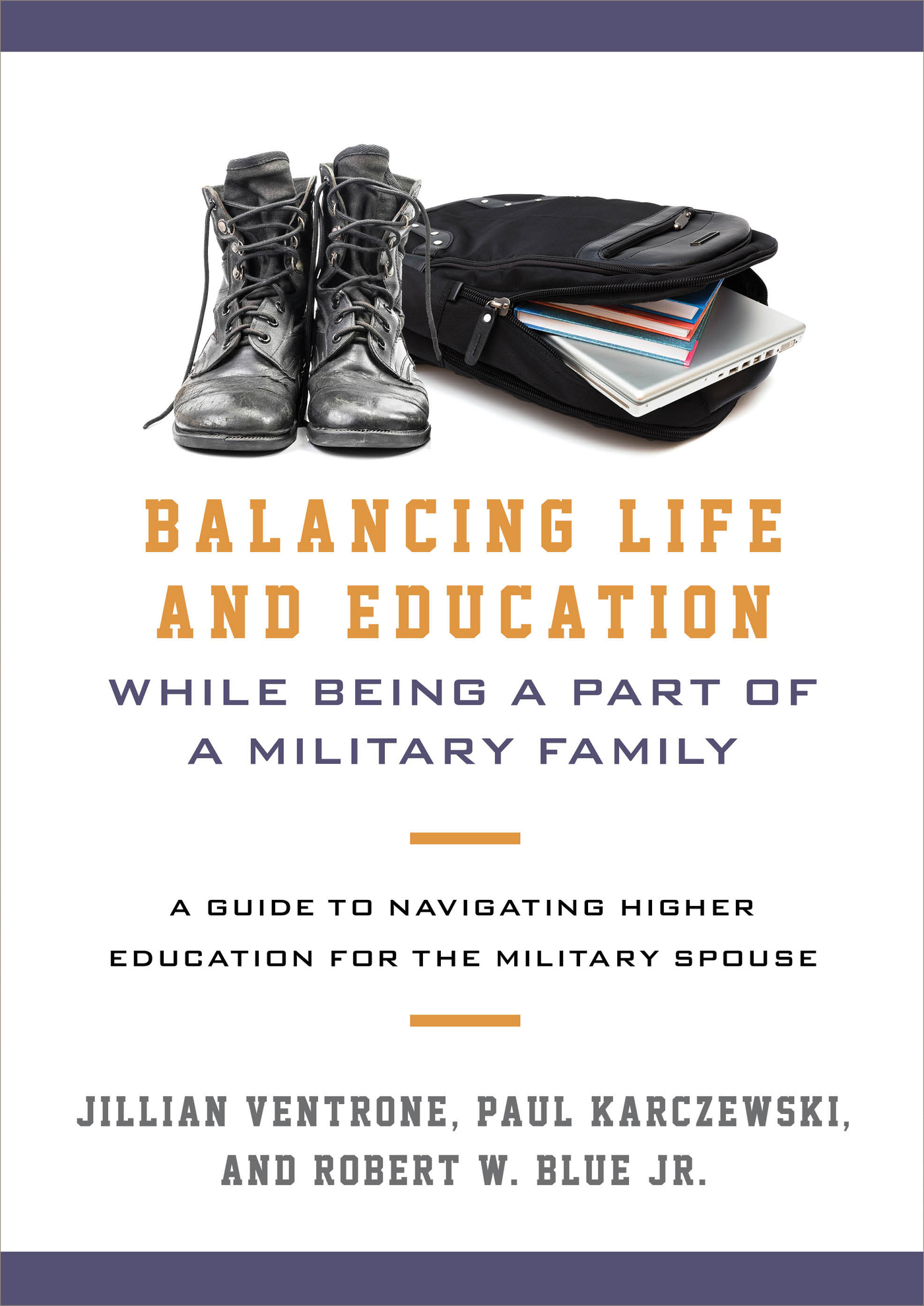Balancing Life and Education While Being a Part of a Military Family
Balancing Life and Education While Being a Part of a Military Family
A Guide to Navigating Higher Education for the Military Spouse
Jillian Ventrone, Paul Karczewski,
and Robert W. Blue Jr.
ROWMAN & LITTLEFIELD
Lanham Boulder New York London
Published by Rowman & Littlefield
A wholly owned subsidiary of The Rowman & Littlefield Publishing Group, Inc.
4501 Forbes Boulevard, Suite 200, Lanham, Maryland 20706
www.rowman.com
Unit A, Whitacre Mews, 26-34 Stannary Street, London SE11 4AB
Copyright 2017 by Rowman & Littlefield
All rights reserved. No part of this book may be reproduced in any form or by any electronic or mechanical means, including information storage and retrieval systems, without written permission from the publisher, except by a reviewer who may quote passages in a review.
British Library Cataloguing in Publication Information Available
Library of Congress Cataloging-in-Publication Data Available
ISBN 9781442260054 (cloth : alkaline paper)
ISBN 9781442260061 (electronic)
 TM The paper used in this publication meets the minimum requirements of American National Standard for Information Sciences Permanence of Paper for Printed Library Materials, ANSI/NISO Z39.48-1992.
TM The paper used in this publication meets the minimum requirements of American National Standard for Information Sciences Permanence of Paper for Printed Library Materials, ANSI/NISO Z39.48-1992.
Printed in the United States of America
Preface
Military spouses are highly motivated to pursue higher education while their partners serve on active duty, but they face numerous challenges, especially considering the sacrifices many have made over the past decade and a half of war. Spouses need to be aware of the resources and options available to them so they can make informed decisions regarding their academic journeys. Balancing Life and Education While Being a Part of a Military Family: A Guide to Navigating Higher Education for the Military Spouse fulfills this need by serving as a long-term reference manual that will support spouses throughout their higher education or vocational pursuits and assist with navigating the available funding resources. This book arms readers with the information they need to properly prepare, plan, and perform the tasks necessary for a successful transition into the world of education. If a spouses goal is to expand his or her credentials through education or training, this is the definitive guidebook.
Introduction
The dependent population is often overlooked when discussing military-based higher education. Spouses require many of the same considerations as service members, such as flexibility in their course work, funding assistance, and convenient school options. These requirements are often hard to find and navigate by oneself. Balancing Life and Education While Being a Part of a Military Family assists this population with finding, pursuing, and paying for higher education.
Just like those on active duty, military dependents face many challenges that they must overcome. Each spouse has a unique set of educational needs. Spouses who understand these needs and properly strategize to address these concerns are more likely to be successful. Constant relocation and frequent deployment cycles for the service member can affect the educational pursuits of those who stay behind. Many spouses are far from home, have children but lack affordable child care, and feel that they have very little support available to assist with their educational goals. While their active-duty spouses often have funding options, the lack of available financial assistance for their dependents can be discouraging. As a result, many forego their long-term educational goals for jobs that often pay lower wages even though they are aware of the many advantages that higher education can provide.
The authors of this book counsel military dependents on federal installations daily; in addition, one is a spouse who pursued advanced education during her husbands active-duty service. The knowledge and expertise the authors have combined in this book will assist the dependent population in navigating the maze of possible options and developing a plan of attack for their educational goals. Whether one is interested in traditional higher education, vocational training, or short-term portable certificate training pathways, Balancing Life and Education While Being a Part of a Military Family arms spouses with the tools they need to achieve success.
Chapter 1
Military Spouse Education Concerns
Military spouses and dependent children who are pursuing higher education often have many of the same needs as their active-duty family members. While counseling this population, we often hear that topics such as flexibility and portability are at the top of the list. Determining what these needs are and learning how to tackle them is the first step in creating goals for your academic pursuits. This chapter addresses many of the special needs that military spouses have regarding their educations, including the following topics: time management, flexible learning, support resources, portability, transferring credit, online versus face-to-face classes, return on investment, and backup plans.
Spousal Education Concerns
Military spouses have unique concerns regarding their educational pursuits, such as numerous permanent change of station (PCS) orders and the deployment cycles of their active-duty spouses. Many families find themselves uprooted every two to three years. A typical military family could be stationed in rural Oklahoma followed by a tour in a major metropolitan area in Florida or even spend a few years at an overseas location. Three major PCS moves in a decade is not an uncommon scenario.
Not every base will have numerous options for training or degrees through classroom attendance. While some bases, such as Naval Air Weapons Station China Lake in California, are located in small communities that do not have four-year colleges in close proximity, many bases do host colleges at the education center office that offer a limited number of associate and bachelors degree programs that you can pursue in a face-to-face format. The difficulty is in finding the type of learner you are and whether you can start with classroom courses and then transition online, because that will most likely be where you will finish most of your classes.
Even if you are stationed in a major metropolitan area, there may be limitations. For example, while there are several Marine Corps and US Navy bases in the San Diego area, getting into schools offering certain programs, such as physical therapy and nursing, can be difficult. Most state-supported colleges in the San Diego metropolitan area are impacted (not enough seats to accommodate all of the students trying to gain access to the programs) due to the popularity of some of these types of programs. Also, not every school offers the same programs. For example, if you are stationed aboard the Camp Pendleton Marine Corps Base, the nearest school offering a masters degree in physical therapy is more than fifty miles away on traffic-clogged freeways. Plus, the admissions pathways into these schools could close as much as ten months in advance. This means that beyond a long drive, you might also not have enough time on station to gain admissions and finish the degree.
Online Degrees
Sometimes online programs are the most realistic options for busy spouses or for those in isolated areas. Be careful in your search for an online school. Do not simply register with the first school that pops up on an Internet search. Typically, it is possible to find general education classes through a reputable institution in an online format, and many state-supported schools offer this option. This is the best pathway for dependents trying to gain credit prior to their spouses separation from the service. If you know that you are a solid online learner, check to see whether the community colleges back home (if that is where you and your spouse will return to) offer online class options. This will help you reduce the risk of losing credit upon a transfer from one school to another. If not, the next best option is to stick to the local state schools. These schools offer you the greatest flexibility for transfer credit. Tuition is often lower, and the credits that you earn are academically sound.
Next page
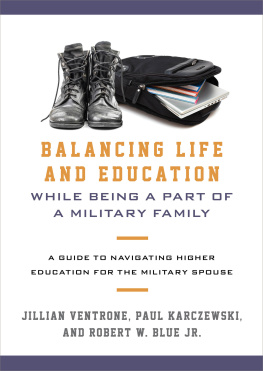


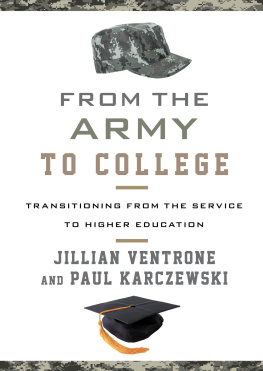

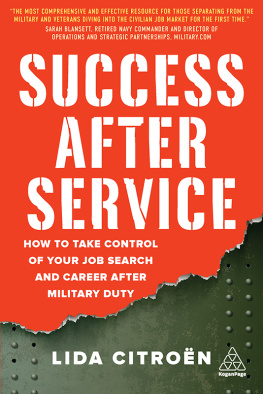

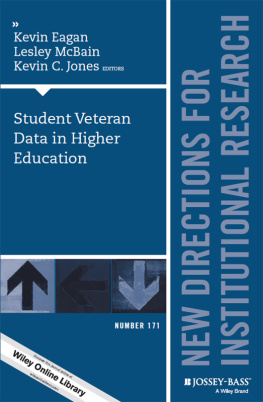
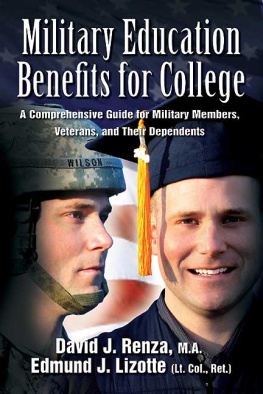
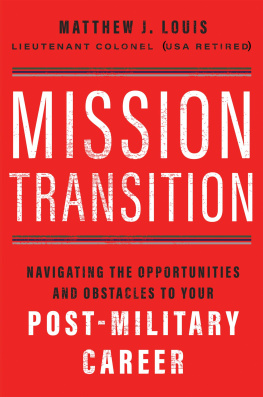
 TM The paper used in this publication meets the minimum requirements of American National Standard for Information Sciences Permanence of Paper for Printed Library Materials, ANSI/NISO Z39.48-1992.
TM The paper used in this publication meets the minimum requirements of American National Standard for Information Sciences Permanence of Paper for Printed Library Materials, ANSI/NISO Z39.48-1992.